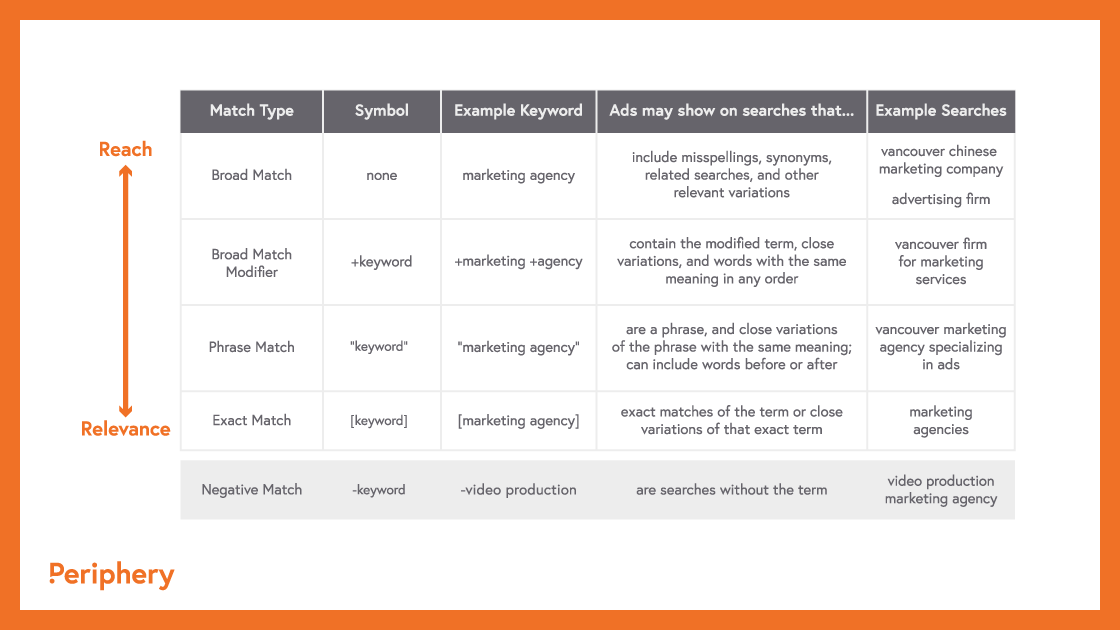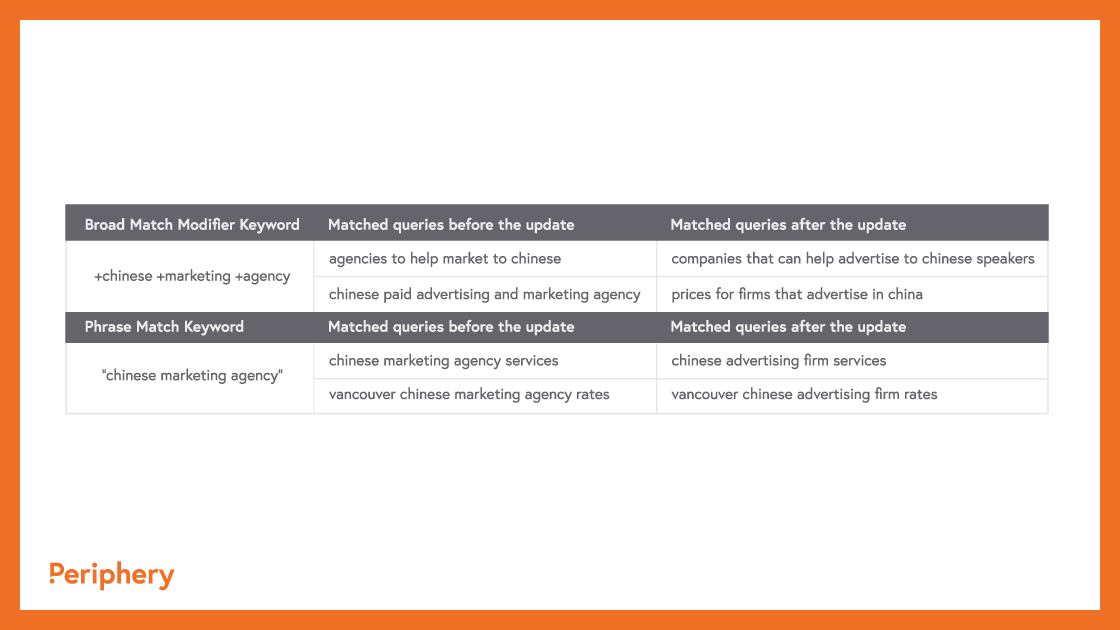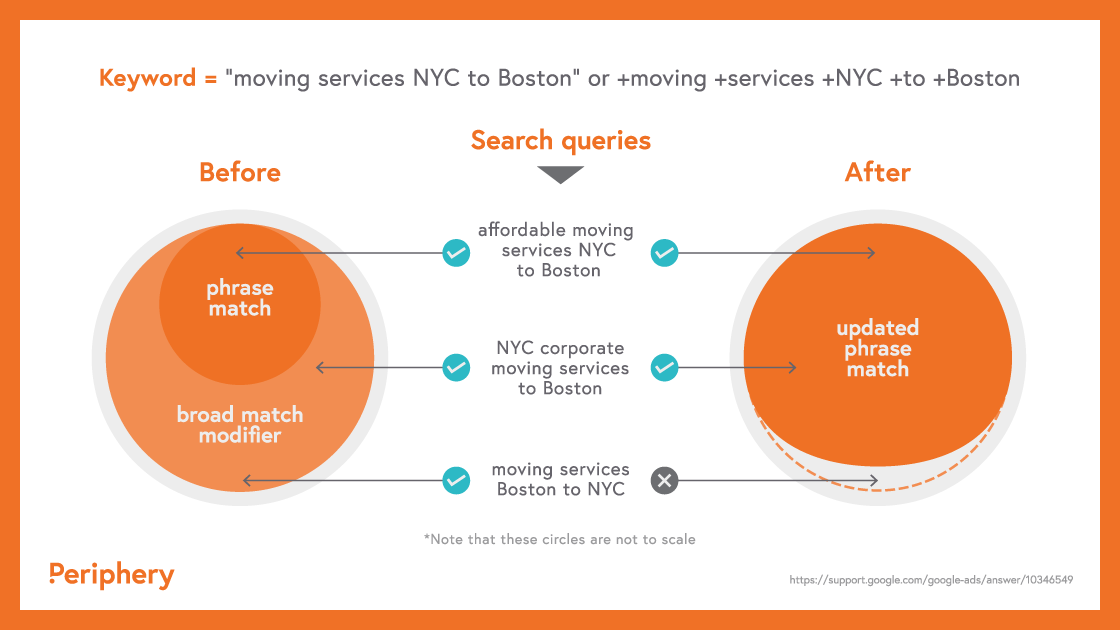Google recently announced changes to its default keyword match types which could potentially have an impact on your Google ad campaigns. As of February 18th, the broad match modifier match type will be removed, and instead, the phrase match type will be expanded upon to incorporate these queries. Google states that these changes are intended to improve the accuracy of queries searched, ultimately providing more relevant results.
But let’s take a step back. What are keyword match types anyway?
Keyword Match Types Explained

When you create a Google Search advertising campaign, you need to ensure you’re not just bidding on your keywords themselves without including special symbols, or else you may be paying for clicks from people who aren’t looking for your offerings.
Google has various criteria for how it serves ads to searchers based on their queries, intended to reach the widest possible audience while still satisfying their intent. Think about it — it would be painstakingly annoying if you were required to brainstorm and add every possible misspelling of your keyword just to capture that traffic. The good news is Google counts these, and other specified criteria, as ‘close variants’, so thankfully you don’t have to.
Beyond close variants, sometimes there are keywords that have the same meaning but are searched for using a completely different sequence of words. Sometimes, you’ll want your ad to show for these queries, too.
This is where match types and symbols come in. By adding symbols to your keywords, Google places the query in one of four (now three) categories to determine whether to trigger your ad for that query. Google uses other methods to determine relevancy, including the user’s recent search activity, the content of the landing page to which your ad points, and other keywords in the ad group.
It’s important to put yourself in your target audience’s shoes when choosing match types. What keywords would they be using to stumble upon your ad? Conduct keyword research to help you. Conversely, you’ll want to make sure your ad doesn’t show for irrelevant searches, or else you’ll be quite literally paying for it.
Broad match is a great choice for accumulating traffic, however, irrelevant traffic only ends up costing you money for low-quality leads who are unlikely to convert. Adding negative keywords is a good way of ensuring your ads are not triggered for irrelevant searches.
Tip: we recommend keeping an eye on your Search Terms report to see which queries triggered your ads. Irrelevant keywords can be added to your negative keyword list.
Broad match modified keywords are identified with a plus (+) sign in front of all words that are required to show in order to trigger your ad. In 2019, this was recently updated to include words with the same meaning. Words may be in any order and ads will still be served if there are additional terms included in the query.
Phrase match is similar to modified broad, but the order of words in the search query is taken into account. Your ads will only be triggered for searches that include the phrase specified within quotation marks and words with the same meaning, but, similarly to broad match modifier, additional words either preceding or following the keyword will still trigger your ad.
Exact match keywords are identified with square brackets surrounding them, and ads are only triggered when the exact keyword is searched for, aside from very close variants as introduced in 2018. Close variants include function words and reordering of words when not changing the meaning of the keyword, plurals, and misspellings. These keywords are more niche and as a result, have a lower search volume than ads with broad match keywords, but may signify higher intent.
What’s the Google Update About?
As previously mentioned, the phrase match type will broaden and begin to include behaviours of broad match modifier keywords while the latter is removed from Google Ads. The changes will be gradually rolled out through the next few months and are projected to wrap up in July of 2021.
In 2019, Google introduced an update to phrase and broad match modifier keywords to include keywords of the same meaning, expanding their definition of close variants.

Google stated this will help advertisers to see “3-4% more clicks and conversions on these keywords [with] 85% [of those] expected to be net-new on average.”
For the current update, Google has completely removed support for future broad match modifiers, indicating they will continue to work for current keywords, but with phrase match functionality. While phrase matching will be expanded to absorb broad match modifier functionality, it’s important to note the update will continue to respect word order when relating to the keyword meaning.

How will this update affect my Google Ads account?
With any changes that are made to tools we use, it’s impossible to predict any effects with certainty — we’ll just have to wait and see. However, we don’t predict this update will have significant effects on campaigns. Since Google released the 2019 update to these match types as explained above, the lines between them were already becoming blurry. The removal of the BMM match type will instead simplify your account structure, making account management easier. Many advertisers previously used these two match types for the same use cases.
Some experts say the continuous blurring of lines regarding match types is to increase Google’s automation share of their ‘smart bidding’ feature to reduce advertiser control over their account structure. Although it will be easier to manage accounts for those with less advertising experience, the reduction of functionality does limit flexibility for more advanced users.
Since all accounts are structured slightly differently, some may see an increase in traffic, while others may see a decrease. If your account is structured by match types, it may be time for you to revisit and adjust your account structure accordingly.
What should I be doing?
Google has stated it is not necessary to convert BMM keywords already in your Google Ads account to phrase match as there will be no performance benefits. Doing so can remove the historical performance statistics of the keywords. When the changes have completely rolled out, Google will update its advertisers in the ‘recommendations’ section about removing duplicate keywords.
It will also be important to keep an eye on budgets. Since keyword behaviour will change, so will traffic coming in. This being said, Google has stated the update will not affect your Quality Score.
There is still ambiguity about how the update will improve account simplicity and ad relevance, therefore, it’s very important to continuously monitor your campaigns for irregular performance and make changes as needed.
Contact us if you have any questions about match types or what we’re doing to keep our clients’ accounts optimized.


